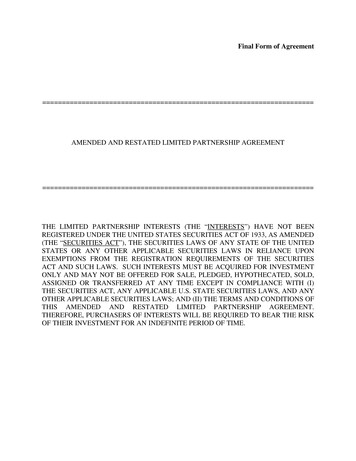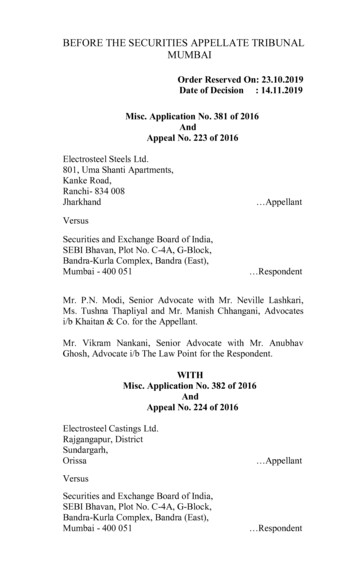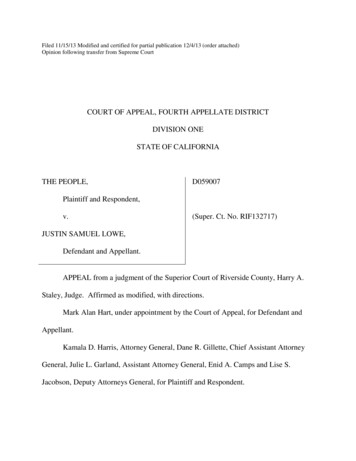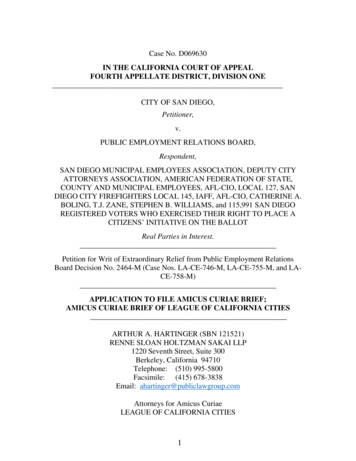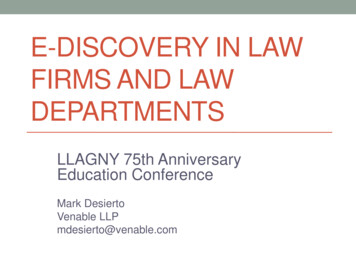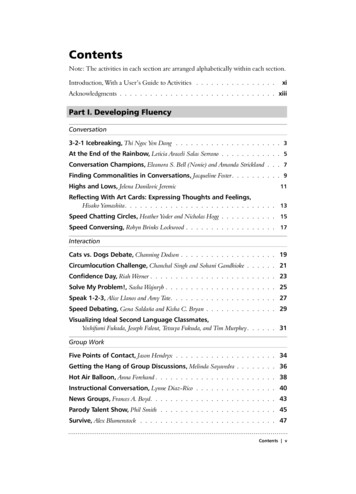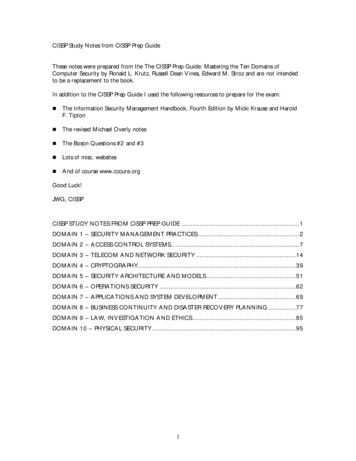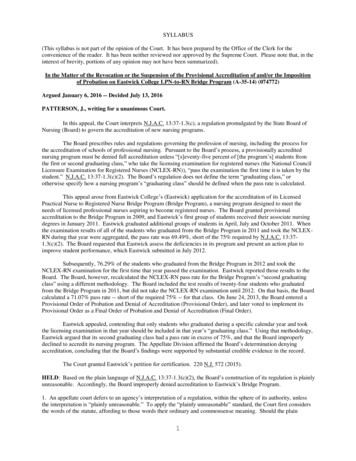
Transcription
SYLLABUS(This syllabus is not part of the opinion of the Court. It has been prepared by the Office of the Clerk for theconvenience of the reader. It has been neither reviewed nor approved by the Supreme Court. Please note that, in theinterest of brevity, portions of any opinion may not have been summarized).In the Matter of the Revocation or the Suspension of the Provisional Accreditation of and/or the Impositionof Probation on Eastwick College LPN-to-RN Bridge Program (A-35-14) (074772)Argued January 6, 2016 -- Decided July 13, 2016PATTERSON, J., writing for a unanimous Court.In this appeal, the Court interprets N.J.A.C. 13:37-1.3(c), a regulation promulgated by the State Board ofNursing (Board) to govern the accreditation of new nursing programs.The Board prescribes rules and regulations governing the profession of nursing, including the process forthe accreditation of schools of professional nursing. Pursuant to the Board’s process, a provisionally accreditednursing program must be denied full accreditation unless “[s]eventy-five percent of [the program’s] students fromthe first or second graduating class,” who take the licensing examination for registered nurses (the National CouncilLicensure Examination for Registered Nurses (NCLEX-RN)), “pass the examination the first time it is taken by thestudent.” N.J.A.C. 13:37-1.3(c)(2). The Board’s regulation does not define the term “graduating class,” orotherwise specify how a nursing program’s “graduating class” should be defined when the pass rate is calculated.This appeal arose from Eastwick College’s (Eastwick) application for the accreditation of its LicensedPractical Nurse to Registered Nurse Bridge Program (Bridge Program), a nursing program designed to meet theneeds of licensed professional nurses aspiring to become registered nurses. The Board granted provisionalaccreditation to the Bridge Program in 2009, and Eastwick’s first group of students received their associate nursingdegrees in January 2011. Eastwick graduated additional groups of students in April, July and October 2011. Whenthe examination results of all of the students who graduated from the Bridge Program in 2011 and took the NCLEXRN during that year were aggregated, the pass rate was 69.49%, short of the 75% required by N.J.A.C. 13:371.3(c)(2). The Board requested that Eastwick assess the deficiencies in its program and present an action plan toimprove student performance, which Eastwick submitted in July 2012.Subsequently, 76.29% of the students who graduated from the Bridge Program in 2012 and took theNCLEX-RN examination for the first time that year passed the examination. Eastwick reported those results to theBoard. The Board, however, recalculated the NCLEX-RN pass rate for the Bridge Program’s “second graduatingclass” using a different methodology. The Board included the test results of twenty-four students who graduatedfrom the Bridge Program in 2011, but did not take the NCLEX-RN examination until 2012. On that basis, the Boardcalculated a 71.07% pass rate -- short of the required 75% -- for that class. On June 24, 2013, the Board entered aProvisional Order of Probation and Denial of Accreditation (Provisional Order), and later voted to implement itsProvisional Order as a Final Order of Probation and Denial of Accreditation (Final Order).Eastwick appealed, contending that only students who graduated during a specific calendar year and tookthe licensing examination in that year should be included in that year’s “graduating class.” Using that methodology,Eastwick argued that its second graduating class had a pass rate in excess of 75%, and that the Board improperlydeclined to accredit its nursing program. The Appellate Division affirmed the Board’s determination denyingaccreditation, concluding that the Board’s findings were supported by substantial credible evidence in the record.The Court granted Eastwick’s petition for certification. 220 N.J. 572 (2015).HELD: Based on the plain language of N.J.A.C. 13:37-1.3(c)(2), the Board’s construction of its regulation is plainlyunreasonable. Accordingly, the Board improperly denied accreditation to Eastwick’s Bridge Program.1. An appellate court defers to an agency’s interpretation of a regulation, within the sphere of its authority, unlessthe interpretation is “plainly unreasonable.” To apply the “plainly unreasonable” standard, the Court first considersthe words of the statute, affording to those words their ordinary and commonsense meaning. Should the plain1
language analysis yield more than one plausible interpretation of the regulation, a reviewing court may considerextrinsic sources, including the long-standing meaning ascribed to the language by the agency charged with itsenforcement. If, however, the regulation’s language is clear, then the interpretative process will end without resortto extrinsic sources. (pp. 10-12)2. Guided by those principles, the Court considers the meaning of the term “first or second graduating class” inN.J.A.C. 13:37-1.3(c)(2). First, in its ordinary and commonsense usage, the term “class,” modified by “graduating,”describes a group of students who complete a program of studies and receive their diplomas or certificates in a givencalendar year. Second, N.J.A.C. 13:37-1.3(c)(2) is plainly intended to give a new nursing program twoopportunities to succeed. Should the “first graduating class” fail to achieve satisfactory test results, the program’sadministrators may critically evaluate the program and address any deficiencies revealed by the first class’sexamination results. To that end, the Board is presented with two sets of NCLEX-RN results, reflecting theachievements of distinct groups of students graduating in different years, and tested by the NCLEX-RN examinationadministered in the year of graduation. Thus, the clear objective of N.J.A.C. 13:37(c)(2) is furthered if the “secondgraduating class” includes only students who have graduated from the program in its second year, following theprogram’s opportunity for self-evaluation and improvement. (pp. 12-14)3. The Board’s interpretation of the term “first or second graduating class” is incongruent with the language of itsregulation. Nothing in N.J.A.C. 13:37-1.3(c)(2) suggests that a “graduating class” is defined by the date of thelicensing examinations that its students choose to take. Moreover, the Board’s interpretation of N.J.A.C. 13:371.3(c)(2) would undermine the objective of giving new nursing programs an opportunity to assess and resolvedeficiencies revealed by the pass rate of the first “graduating class.” (p. 14)4. The language of N.J.A.C. 13:37-1.3(c)(2) stands in stark contrast to that of the regulations implemented in otherjurisdictions, cited by the Board as evidence of a national practice. The regulations in effect in other jurisdictionsclearly place their states’ nursing programs on notice that for purposes of accreditation, their licensing examinationpass rates will be calculated based on the students’ year of examination, whether or not they graduated in that year.In contrast, the Board has not incorporated its stated methodology into N.J.A.C. 13:37-1.3(c)(2). (pp. 14-15)5. In short, notwithstanding the Court’s deferential review of the Board’s construction of its regulation, the Courtdiscerns no foundation for the Board’s interpretation of the plain language in N.J.A.C. 13:37-1.3(c)(2), and finds theBoard’s interpretation of N.J.A.C. 13:37-1.3(c)(2) to be plainly unreasonable. When the Board calculated theNCLEX-RN examination pass rate for the “second graduating class” of Eastwick’s Bridge Program, it improperlyincluded the examination results of students who graduated from the Bridge Program during its first year, 2011, butdid not take the examination until 2012. Under a proper application of N.J.A.C. 13:37-1.3(c)(2), the Board wouldhave found the “second graduating class” of Eastwick’s Bridge Program to have achieved a NCLEX-RN pass rateabove the required 75%. Therefore, the Board’s Final Order denying accreditation and placing the Bridge Programon probation was unsupported by substantial credible evidence in the record, and the Board improperly deniedaccreditation in accordance with N.J.A.C. 13:37-1.1 to -1.3. (pp. 16-17)6. In closing, the Court makes no determination as to whether Eastwick would have met the requirements tomaintain accreditation, prescribed in N.J.A.C. 13:37-1.4 to -1.15, after the Board’s Final Order. The Court directsthat on remand, a record regarding the Bridge Program’s status following the Final Order can be developed, and anappropriate remedy determined. (p. 17)The judgment of the Appellate Division is REVERSED and the matter is remanded to the State Board ofNursing for proceedings consistent with this opinion.CHIEF JUSTICE RABNER, JUSTICES ALIBN and SOLOMON, and JUDGE CUFF (temporarilyassigned) join in JUSTICE PATTERSON’s opinion. JUSTICES LaVECCHIA and FERNANDEZ-VINA didnot participate.2
SUPREME COURT OF NEW JERSEYA-35 September Term 2014074772IN THE MATTER OF THEREVOCATION OR THE SUSPENSIONOF THE PROVISIONALACCREDITATION OF AND/OR THEIMPOSITION OF PROBATION ONEASTWICK COLLEGELPN-TO-RN BRIDGE PROGRAMAPPROVED TO ESTABLISH ASCHOOL OF REGISTERED NURSINGIN THE STATE OF NEW JERSEY.Argued January 6, 2016 – Decided July 13, 2016On certification to the Superior Court,Appellate Division.Robert A. Mintz argued the cause forappellant Eastwick College (McCarter &English and Schulman & Kissel, attorneys;Julian A. Schulman, on the briefs).Olga E. Bradford, Deputy Attorney General,argued the cause for respondent New JerseyState Board of Nursing (John J. Hoffman,Acting Attorney General of New Jersey,attorney; Andrea M. Silkowitz, AssistantAttorney General, of counsel).JUSTICE PATTERSON delivered the opinion of the Court.In this appeal, the Court interprets N.J.A.C. 13:37-1.3(c),a regulation promulgated by the State Board of Nursing (Board)to govern the accreditation of new nursing programs.Pursuantto the regulation, a provisionally accredited nursing programmust be denied full accreditation unless “[s]eventy-five percent1
of [the program’s] students from the first or second graduatingclass,” who take the licensing examination for registerednurses, “pass the examination the first time it is taken by thestudent.”N.J.A.C. 13:37-1.3(c)(2).A new nursing program thatfails to meet that benchmark is placed on probation and barredfrom admitting new students, and may lose its provisionalaccreditation.In 2013, the Board invoked N.J.A.C. 13:37-1.3(c)(2) to denyaccreditation to the Licensed Practical Nurse to RegisteredNurse Bridge Program (Bridge Program), a nursing programinstituted by Eastwick College (Eastwick).Interpreting theterm “graduating class” in N.J.A.C. 13:37-1.3(c)(2) to includeall graduates of the program who took the licensing examinationduring a given calendar year, regardless of the year aparticular student graduated from the program,the Board found that Eastwick’s Bridge Program’s first andsecond graduating classes failed to achieve the 75% pass ratemandated by the regulation.Eastwick appealed the Board’s determination, challengingthe methodology used by the Board to calculate the pass rate ofthe Bridge Program’s graduates on the licensing examination.Eastwick contended that only students who graduated during aspecific calendar year and took the licensing examination inthat year should be included in that year’s “graduating class.”2
Using that methodology, Eastwick argued that its secondgraduating class had a pass rate in excess of 75%, and that theBoard improperly declined to accredit its nursing program.AnAppellate Division panel affirmed the Board’s determinationdenying accreditation.Based on the plain language of N.J.A.C. 13:37-1.3(c)(2), weconclude that the Board’s construction of its regulation isplainly unreasonable, and accordingly hold that the Boardimproperly denied accreditation to Eastwick’s Bridge Program.We therefore reverse the Appellate Division’s judgment affirmingthe Board’s action, and remand this matter for furtherproceedings.I.In accordance with the Legislature’s grant of authority inthe Nurse Practice Act, N.J.S.A. 45:11-24(d)(19), the Board“prescribe[s] rules and regulations” governing the profession ofnursing.The Board maintains oversight of professionallicensing for nurses; it requires that all applicants forlicensure as registered nurses pass the National CouncilLicensure Examination for Registered Nurses (NCLEX-RN).N.J.A.C. 13:37-2.1(a).The Board also has established a process for theaccreditation of schools of professional nursing.N.J.S.A.45:11-24(d)(13); see also N.J.A.C. 13:37-1.1 to -1.18.3To
establish a nursing program, an educational institution mustfile an application pursuant to N.J.A.C. 13:37-1.2.If theBoard grants provisional accreditation to the new nursingprogram, the program may admit students.N.J.A.C. 13:37-1.3(a).The program may retain its provisional status for no more thantwo years after the date on which the first class graduates.N.J.A.C. 13:37-1.3(e).A provisionally accredited nursing program may not be fullyaccredited until it meets the following requirements, set forthin N.J.A.C. 13:37-1.3(c):1. The first class has graduated;2. Seventy-five percent of students from thefirst or second graduating class, who havetaken the licensing examination, pass theexamination the first time it is taken by thestudent; and3. A self-study report is submitted to theBoard that shows the nursing program is incompliance with the requirements of N.J.A.C.13:37-1.4 through 1.11.The regulation does not define the term “graduating class,”or otherwise specify how a nursing program’s “graduating class”should be defined when the pass rate is calculated.Prior toits dispute with Eastwick, the Board publicly interpreted thatterm in the minutes of a meeting held on June 17, 2008.minutes state:Those“‘class’ as per N.J.A.C. 13:37-1.3 will bedefined as all the graduates from a nursing program who are4
first-time NCLEX test takers during a one-year period of timeextending from January 1 through December 31.”The Board,however, did not amend its regulation to incorporate thatdefinition, in accordance with the rulemaking procedures of theAdministrative Procedure Act (APA).See N.J.S.A. 52:14B-3, 4,4.9 to -5.This case arose from Eastwick’s application for theaccreditation of its Bridge Program, designed to meet the needsof licensed professional nurses aspiring to become registerednurses.1Under the plan devised by Eastwick, a student wouldcommence his or her studies on one of four alternative dates ina calendar year and be awarded an Associate Degree in AppliedScience in Nursing at the conclusion of the program.Followinggraduation, the student would be eligible to take the NCLEX-RN,but would not be required by the school to do so.On September 22, 2009, the Board granted provisionalaccreditation to Eastwick’s Bridge Program.Eastwick admittedits first group of students shortly thereafter.Its firsttwenty graduates received their associate nursing degrees inEastwick, founded in 1968, serves a diverse student populationconsisting primarily of older students who have been out ofschool and employed for a decade or more. When it soughtaccreditation for its Bridge Program, Eastwick had alreadyachieved and maintained full accreditation for two nursingprograms, its Licensed Practical Nursing Program and itsBilingual Licensed Practical Nursing Program.15
January 2011.Nineteen of those twenty students, or 95%, passedthe NCLEX-RN licensing examination.Eastwick graduatedadditional groups of students in April, July and October 2011.When the examination results of all of the students whograduated from the Bridge Program in 2011 and took the NCLEX-RNduring that year were aggregated, the pass rate was 69.49%,short of the 75% required by N.J.A.C. 13:37-1.3(c)(2).On February 27, 2012, the Board requested that Eastwickassess the deficiencies in its program and present an actionplan to improve student performance.Eastwick evaluated factorsincluding its admission criteria, its curriculum, and the timegap between the students’ course work and the NCLEX-RNexamination.It prepared an action plan to improve its program,and submitted that plan to the Board in July 2012.The ninety-seven students who graduated from the BridgeProgram in January, April, July and October 2012, and took theNCLEX-RN examination for the first time that year, fared betterthan their predecessors; seventy-four, or 76.29%, of the 2012graduates passed the examination.results to the Board.Eastwick reported thoseThe Board, however, recalculated theNCLEX-RN pass rate for the Bridge Program’s 2012 graduates,using a different methodology.In the statistics for the BridgeProgram’s “second graduating class,” the Board included the testresults of twenty-four students who graduated from the Bridge6
Program in 2011, but did not take the NCLEX-RN examination until2012.On that basis, the Board calculated a 71.07% pass rate --short of the required 75% -- for that class.On June 24, 2013, the Board entered a Provisional Order ofProbation and Denial of Accreditation (Provisional Order),pursuant to N.J.A.C. 13:37-1.3(e).The Board conceded thatEastwick had met the requirements of N.J.A.C. 13:37-1.3(c)(1)and (3) by graduating its first class and submitting a selfstudy report, but found that Eastwick failed to satisfy the passrate requirement of N.J.A.C. 13:37-1.3(c)(2).The Board statedits intent to deny the Bridge Program accreditation and to placeit on probation, effective thirty business days after entry ofthe Board’s Provisional Order, unless Eastwick submitted awritten request to modify or dismiss the Board’s findings.Eastwick submitted its request for modification ordismissal.It first argued that the twenty students whograduated from the Bridge Program in January 2011, whose passrate on the NCLEX-RN examination was 95%, should be deemed toseparately constitute a “graduating class.”In the alternative,Eastwick contended that if the term “graduating class” weredefined based on a calendar year, the “class” should include allstudents who graduated and took the NCLEX-RN licensingexamination for the first time during the year of graduation.7
Eastwick contended that under either methodology, its “first orsecond graduating class” achieved the required pass rate.The Board rejected Eastwick’s arguments.It voted toimplement its Provisional Order as a Final Order of Probationand Denial of Accreditation (Final Order).The Board foundEastwick’s method of calculating its “graduating class”contravened nationally accepted nursing education policies, anddeemed it to be arbitrary, capricious and overly burdensome.Insupport of its construction of N.J.A.C. 13:37-1.3(c)(2), theBoard cited the June 17, 2008 minutes of its public meeting, inwhich it provided its definition of “class.”Eastwick appealed the Board’s Final Order.An AppellateDivision panel affirmed the Board’s determination, concludingthat the Board’s findings were supported by substantial credibleevidence in the record.We granted Eastwick’s petition for certification.220 N.J.572 (2015).II.Eastwick contends that it met N.J.A.C. 13:37-1.3(c)(2)’srequirements because the twenty students who graduated from theProgram in January 2011 had a 95% pass rate on the NCLEX-RNlicensing examination.Alternatively, Eastwick urges the Courtto define a “graduating class” to include all graduates of anursing program in a particular year who took the examination in8
that same year.Eastwick argues that the Board’s constructionof N.J.A.C. 13:37-1.3(c)(2) is plainly unreasonable, and thatthe Board’s determination was arbitrary and capricious.Itcontends that, to the extent that the Board relies on thedefinition of “class” in the minutes of its June 17, 2008 publicmeeting, the Board’s action constitutes improper rulemakingcontrary to the APA, under this Court’s decision in Metromedia,Inc. v. Director, Division of Taxation, 97 N.J. 3
EASTWICK COLLEGE LPN-TO-RN BRIDGE PROGRAM APPROVED TO ESTABLISH A SCHOOL OF REGISTERED NURSING IN THE STATE OF NEW JERSEY. Argued January 6, 2016 – Decided July 13, 2016 On certification to the Superior Court, Appellate Division. Robert A. Mintz argued the cause for appellant Eastwick College (McC
